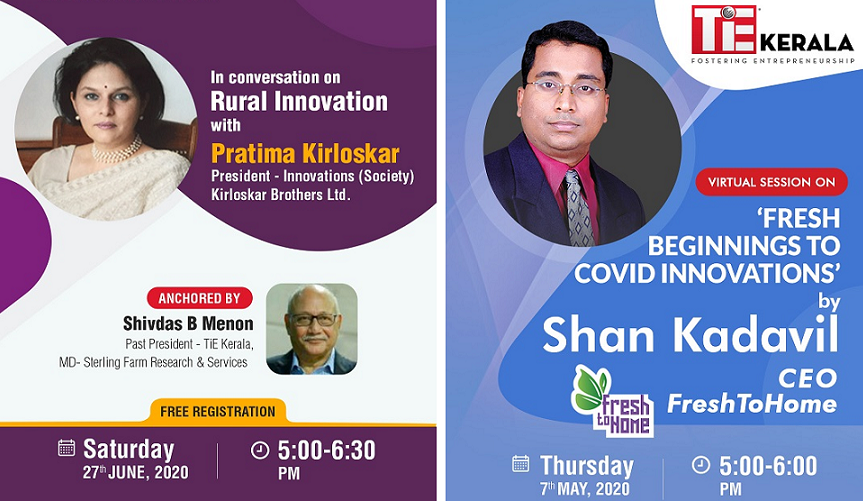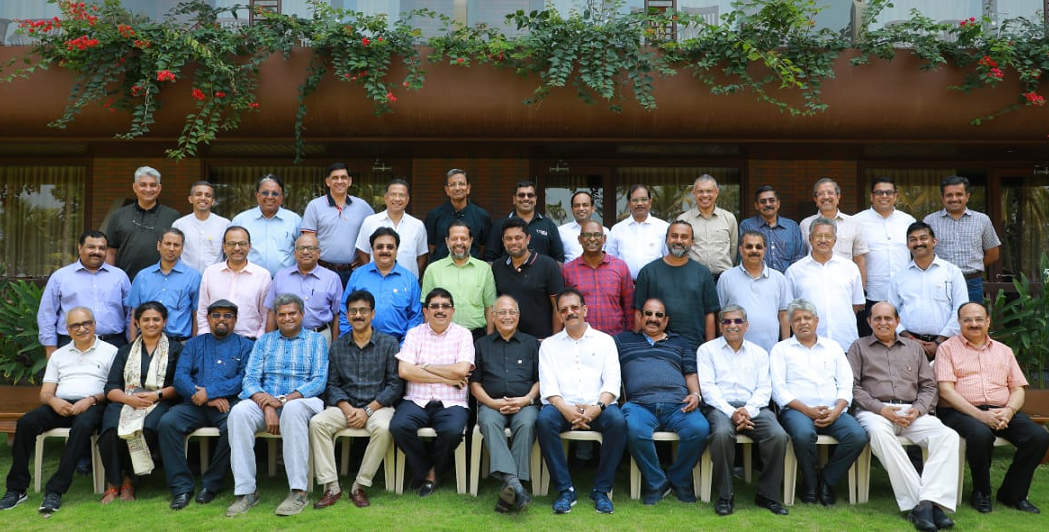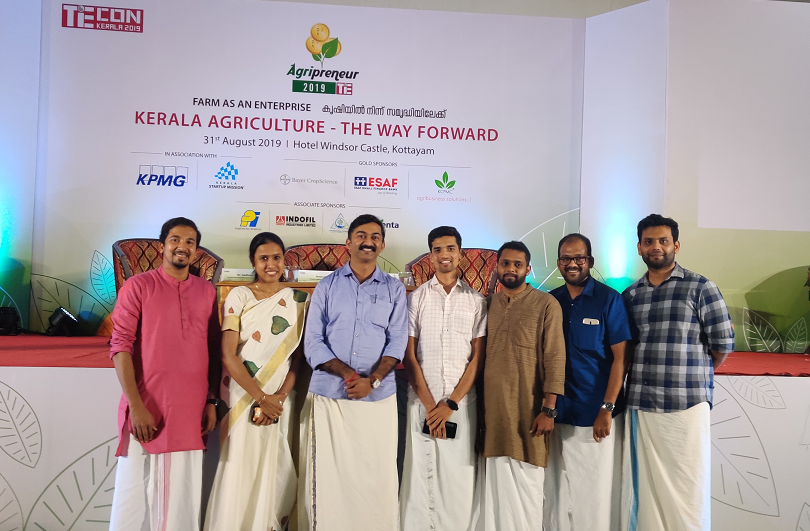The coronavirus pandemic has dealt a body blow to livelihoods and fortunes around the world. But life has to go on, and a range of entrepreneurship support organisations have stepped up to tackle the COVID-19 crisis.
This includes TiE Kerala, the local chapter of the global network called The Indus Entrepreneurs, founded in Silicon Valley in 1992. See also our earlier profiles of resilience activities by TiE Bangalore and TiE Pune.

Support for entrepreneurs
Over the last four months, TiE Kerala organised more than 30 online events, some of which attracted over 300 participants. “With the outbreak of the COVID pandemic and the subsequent lockdown, TiE Kerala has moved all its physical programmes to a virtual mode,” explains Nirmal Panicker, Executive Director of Kochi-based TiE Kerala, in a chat with YourStory.
“Interestingly, the result of moving online was that the number of activities increased substantially, and so has the average participation for these virtual sessions. The virtual platform has also enhanced the quality of programmes with prominent speakers and industry leaders from other locations joining in,” Nirmal observes.
The average participation was 125 per session, with a total registrations count of 3,775. Other TiE chapters in India also took part, such as Bangalore, Chennai, Coimbatore, Pune, and Mumbai – as well as overseas (Middle East, Germany).
The event formats included webinars, panel discussions, knowledge sessions, masterclasses, startup showcases, storytelling (‘My Story’), and Ask Any Question (AAQ). For example, the session Startup Founder’s Funda focussed on the art of fundraising.
Other sessions covered a wide range of topics: New Normal for the FMCG Sector (K Ranganathan, Founder Chairman, CavinKare); My Story (PC Musthafa, ID Fresh Foods); Rural Innovation (Pratima Kirloskar, Innovation Society, Kirloskar Group); and Theory of Constraints for Entrepreneurs (Boman Moradian, Jamnalal Bajaj Institute).
There was also a three-series session on Managing Family Business (in partnership with SP Jain Institute) and a panel on Surviving the Unsettling Times (in association with the IT Ministry, Government of Kerala, and Kerala Startup Mission). Recommendations were presented to the state government for actions, Nirmal explains.
TiE Kerala’s in-depth sessions have covered financial management, imagining techniques for the post-COVID period, virtual customer acquisition, business continuity, case studies (eg. MyLab), frugal innovation, online teams, cybersecurity, and mindfulness.

TiE Kerala - Charter Members
Challenges
“TiE Kerala initiated a detailed survey among our membership immediately after the pandemic struck, to access challenges faced by entrepreneurs and business community,” Nirmal says. Results showed that 33 percent of the entrepreneurs face challenges in customer outreach, 22 percent face cash-flow problems, and 14 percent face operations and supply chain challenges.
“TiE Kerala has been consistently conducting focussed programmes to address these challenges. We identified a lack of measurable mentoring available for startups. We therefore initiated an online platform for startups to schedule mentoring sessions with TiE Kerala Charter Members,” he explains.
Earlier, TiE Kerala flagged off the Kerala Angel Network (KAN), a funding entity formed by TiE Kerala Charter Members. “KAN is actively reviewing startup investment opportunities in the local ecosystem,” Nirmal adds.
Opportunities
Despite the above challenges, the COVID-19 crisis has also opened up a range of opportunities. “SaaS and collaboration tech sectors have witnessed good traction recently, as businesses are shifting online,” Nirmal observes.
“Edtech platforms have the highest sign-ups in the past four months. We have also seen strong funding and re-investments in this sector,” he adds. As an example, he cites Entri App.
Another sector with good traction is agri-tech. “Many NRI returnees are investing in this sector, with the Grow Your Own Food concept,” Nirmal observes.
To tap these opportunities, TiE Kerala is organising upcoming sessions on digital marketing, analytics for operational efficiency, and homestead farming.

TiE Kerala staff
Organisational capacity
The TiE Kerala has withstood the pandemic upheaval and ploughed on ahead. “TiE Kerala secretariat has maintained its staff strength of six people. There is no intention of a salary cut or downsizing,” Nirmal emphasises.
“In fact, we are probably the only chapter globally which has increased its membership fee in the last three months. As a result, we have credible reserves and the members have more value with the additional takeaway of access to TiE Global events,” he explains.
Other benefits include free access to all chapter programmes, free mentoring, and access to funds through the Kerala Angel Network. “Another achievement is that 80 percent of our charter members have paid their renewals till 2021,” Nirmal proudly says.
Role of government
The Kerala State government has been proactive in supporting the startup ecosystem and the technology sector companies. “The single window clearance mechanism K-SWIFT was quickly launched, and has accelerated the clearance system for setting up businesses in Kerala,” Nirmal explains.
TiE Kerala, in collaboration with a few other associations in the state, has shared a list of recommendations to the Ministry of Industries. These include rent waiver for six months in technology parks for startups and technology companies, which has been approved.
“The Kerala Startup Mission, which is the nodal body for promoting startups in the state, has ensured that its facilities are open and functioning even during COVID times. They have been spurring the investment ecosystem available for startups by playing the role of lead investors in most cases,” Nirmal says.
Tips and advice
TiE Kerala also offers a range of tips for entrepreneurs on topics ranging from innovation and cashflow to pivots and mental health. For example, cash flow and finance activities should include close monitoring of revenue streams, well-planned decisioning, digitalisation, diversification, productivity techniques, and local market outreach.
“We are witnessing the most changes in current times. Pivoting has never made more sense, especially for startups who have not yet found their product-market fit,” Nirmal observes. He advises startups to constantly look out for opportunities in the market where their product or service can be extended as a solution with meaningful economics.
Mental health is also key in these turbulent times. He advises entrepreneurs to prioritise their goals, improve leadership skills, and inspire their teams. “Invest in your own wellbeing, maintain a good diet, motivate yourself, and meditate often,” Nirmal signs off.
(Edited by Megha Reddy)
Want to make your startup journey smooth? YS Education brings a comprehensive Funding Course, where you also get a chance to pitch your business plan to top investors. Click here to know more.
Link : https://yourstory.com/2020/07/tie-kerala-startups-coronavirus
Author :- Madanmohan Rao ( )
July 29, 2020 at 11:48AM
YourStory


